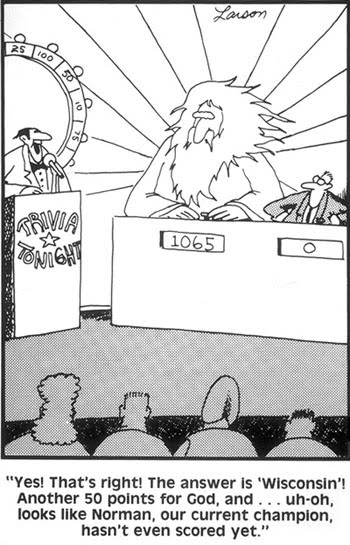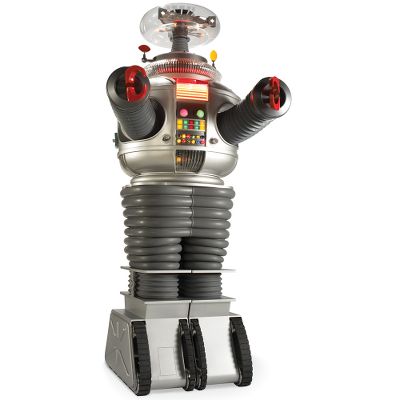I propose an even greater challenge:

Posted on 12/13/2010 9:36:29 PM PST by Justaham
The game show "Jeopardy" will pit man versus machine this winter in a competition that will show how successful scientists are in creating a computer that can mimic human intelligence.
Two of the venerable game show's most successful champions — Ken Jennings and Brad Rutter — will play two games against "Watson," a computer program developed by IBM's artificial intelligence team. The matches will be spread over three days that will air Feb. 14-16, the game show said on Tuesday.
The competition is reminiscent of when IBM developed a chess-playing computer to compete against chess champion Garry Kasparov in 1997.
The "Jeopardy" answer-and-question format is a different kind of challenge. It often requires contestants to deal with subtleties, puns and riddles and come up with answers fast.
"Watson" is named for IBM founder Thomas J. Watson. It will look nothing like the computer "maid" on "The Jetsons." Rather, IBM said its on-screen appearance will be represented by a round avatar.
The computer has already been tested in some 50 games against past "Jeopardy" champions. But neither IBM nor "Jeopardy" representatives would say what "Watson's" record was.
The winner gets a $1 million prize. IBM said it would donate its winnings to charity, while Jennings and Rutter said they would give half of their prize money away.
Jennings had the game show's longest winning streak, taking 74 games in a row during the 2004-2005 season. Rutter has won more money than any other "Jeopardy" player, nearly $3.3 million during his original appearance and three subsequent tournaments.
IBM is hoping the technology it exhibits will have some practical uses eventually, for instance helping doctors diagnose illnesses or solving customer problems at technical support centers.
(Excerpt) Read more at news.yahoo.com ...
Ugh, always worries me when people do this kind of thing. It gives the uninitiated the false impression that there is such a thing as “real” AI.
I believe that is called "taxes." I'll take "25%" for 1,000,000 Alex.
Why not just have a computer do what Alex does, that would be easy. I’m sure it would do just as good a job, and not look smug while doing it.
So what do they do with “Watson”? Hook a Cat5 into it, and have it Google every Jeopardy question? Chess is one thing—there are moves and counter-moves to study and predict. Jeopardy is just straight factoid knowledge.
Perhaps it’s like the computer that took voice commands from Scotty in the original Star Trek Series
I propose an even greater challenge:

I agree. This is more of a database interface issue than anything else.
Open the door Hal.

Danger! Will Robinson!
Well, it would have to understand the subject and the question. So there’s a lot of text analysis and comprehension required (very difficult) and then it has to access it’s knowledge base for an answer, pick the correct answer, and phrase it as a question.
Not really so easy with a computer. What helps is the rigid format of Jeopardy questions.
I guess it’s about natural language parsing. It’s one thing for a computer to solve “SELECT max(age) FROM xvii_century WHERE country IN europe etc...” and another to understand “This NFL quarterback is a great-great-great-grandson of Brigham Young” well enough to look for the answer.
What is...Judgment Day?
Correct!
I’ll take bad ideas in science for a Thousand, Alex.
I'm thinking search terms and connection speed.
Yes, that’s it: Designing a computer that can process and understand natural language http://www.research.ibm.com/deepqa/
I dunno, but Deep Blue sure made a fool out of Kasparov. He used to be interested in computer chess, but not after that. He should have played some old Windows 3.0 programs like GNU Chess and Winchess. Those things had amazingly stupid AIs.
Actually, the chess program included with Windows 7 is just as stupid, but the graphics are better.
As one of the last GIs to use Morse Code in military communication, it was of great interest to me about a month ago when some outfit held a contest between two guys communicating via Morse, and two other guys using cell phones to send text messages. The two teams were given identical messages to send back and forth.
The two guys using Morse did not use a standard telegraph key, but rather a semi-automatic mechanical speed device we called a “Bug” in the Army. The Morse Code guys got their messages sent back and forth, and then “had time for a sandwich” before the texters were finished! Hopefully the contest with “Watson” will have a similar outcome. Hoooaahh!!
I remember that Kasparov used to play versus Fritz.
Disclaimer: Opinions posted on Free Republic are those of the individual posters and do not necessarily represent the opinion of Free Republic or its management. All materials posted herein are protected by copyright law and the exemption for fair use of copyrighted works.